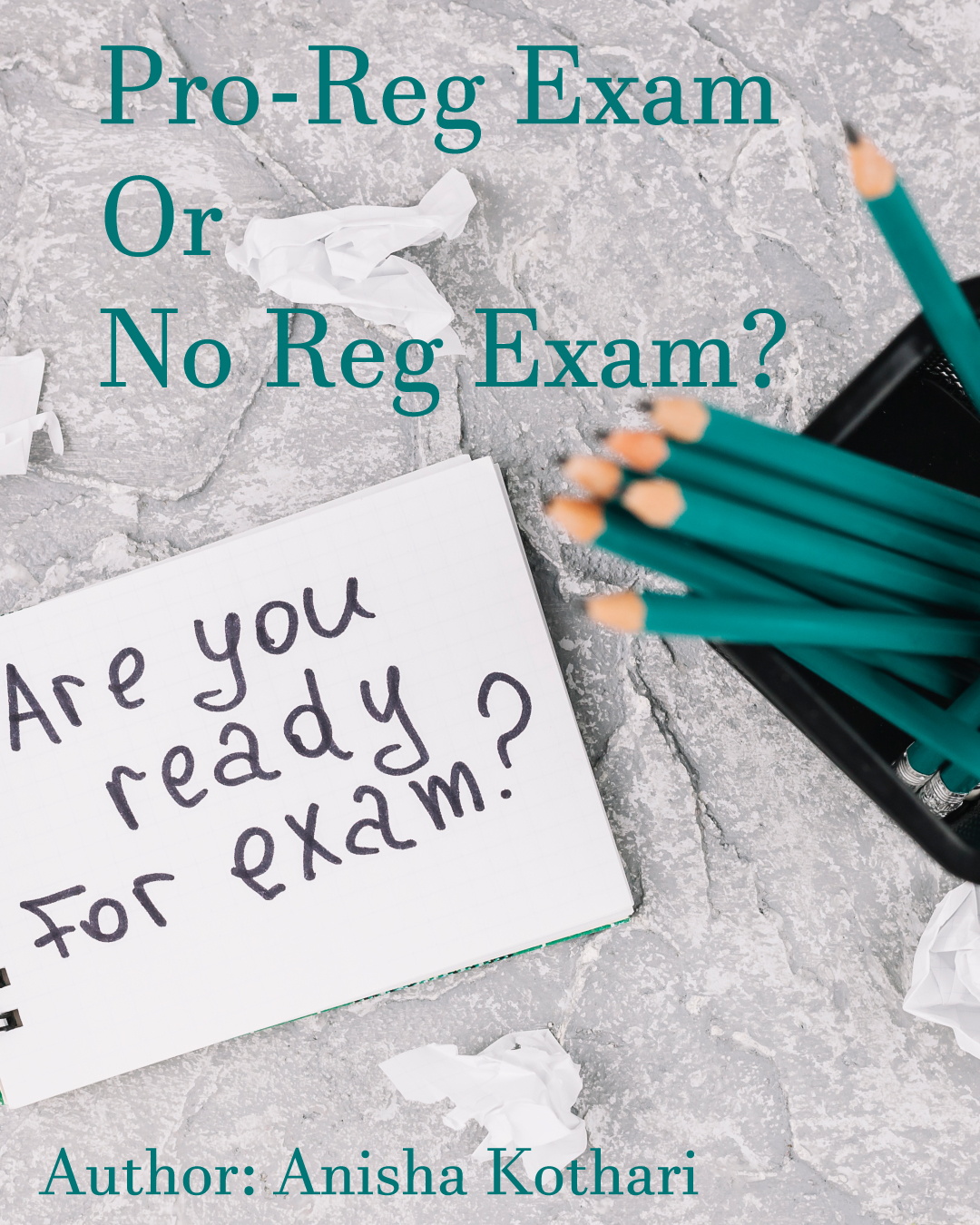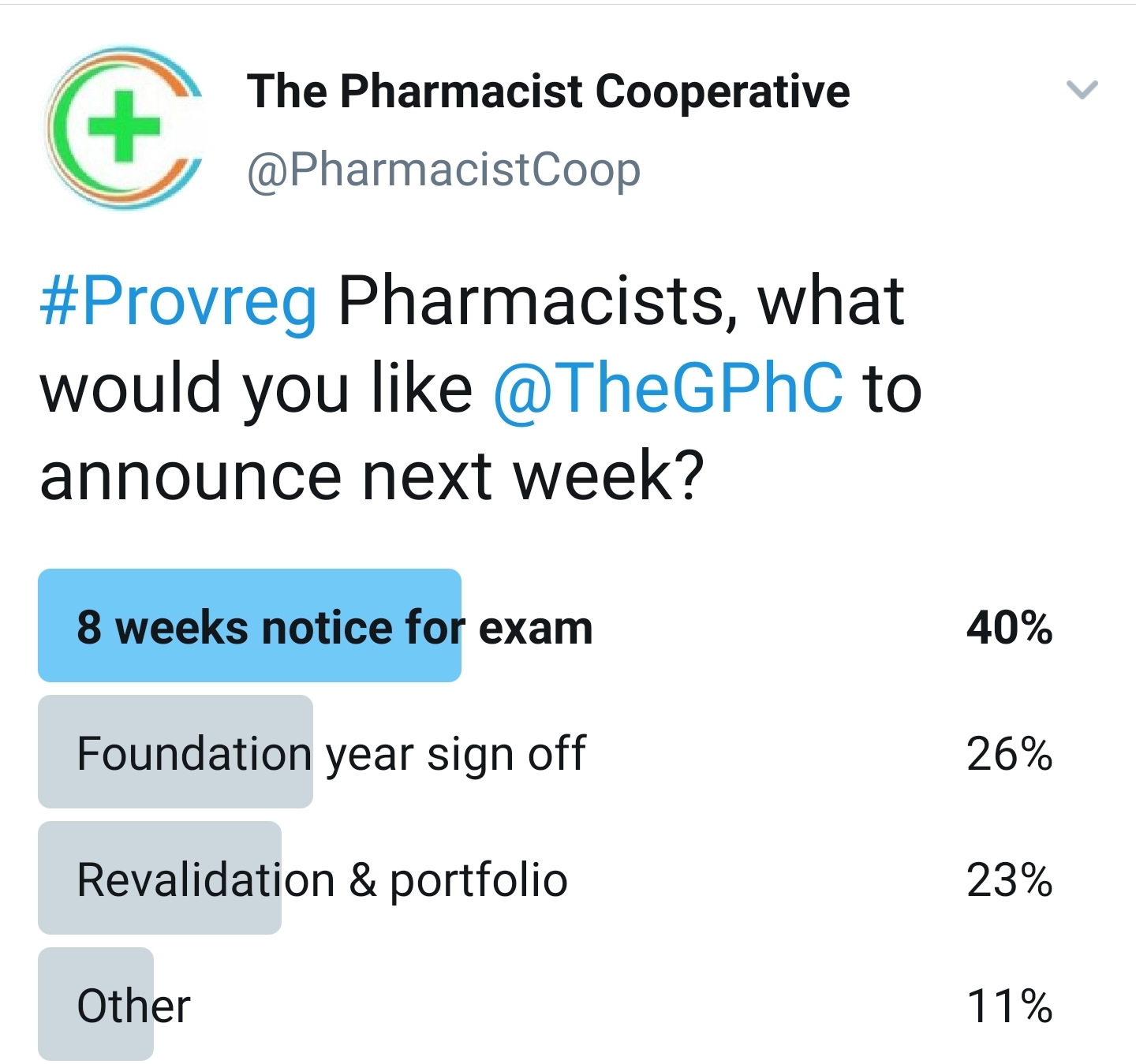Pro-Reg Exam Or No Reg Exam?
10 Oct . 7 min read.

In response to the COVID-19 Pandemic, the GPhC announced the introduction of Provisional Registration (Prov-Reg) to enable trainee Pharmacists to register as Pharmacists for 12 months, to help support the NHS in providing patient care. It is important to note that this provisional registration is only until July 2021 and the Prov-Reg requirements and guidelines state that the individual should sit the pre-registration assessment at their earliest opportunity, if fit to do so. This registration assessment is a vital step in assessing the individual's ability to practice independently as a Responsible Pharmacist.
There are currently 2374 Prov-regs on the register who have been the topic of ongoing debates about whether the registration exam is needed. A poll was conducted by The Pharmacist Cooperative to ascertain their views, with 102 respondents the findings were as follows:

The assessment date is yet to be confirmed, but the GPhC has stated it will take place in the first quarter of 2021 between 18th January and 31st March. However, the “late” notice has caused concern and annoyance amongst Prov-Regs’ and their supervisors. They argue that a looming exam will cause undue stress (owing to the ongoing pandemic), does not protect Prov-Regs’ rights, does not appropriately assess who is fit to practice and will be hard to govern if done online. Many believe that alternative methods of assessment should be considered, for example, assessment in practise rather than via an exam.
On the other hand, some feel as if the assessment is almost a “right of passage” and a hurdle every Pharmacist must overcome to successfully register. They believe not sitting an exam disrupts the integrity of the register, as well as the wider profession. They argue that the purpose of the register and the assessment is to deem individuals fit to practise and provide a means of ensuring patient safety. Without the registration exam, the profession is not regulated nor safeguarded.
Several members of the profession have weighed in on the discussion stating their views on the matter, below is a breakdown of some of the arguments for and against (note: this is not an exhaustive summary of the discussion).
One statement against the assessment: "In employment law, you’re a pharmacist if you’ve worked as one". In response to this, another member stated: "In employment law, if you’ve had certain arrangements for a period of time, you can acquire the status of 'employee' or 'worker'. It doesn’t change your profession and has nothing to do with regulation". My understanding of this is, some argue that if they are working as Pharmacists and doing the role of a fully qualified Pharmacist, they should rightfully be referred to as one and are deemed fit to practise as one. The counterargument is that this is a temporary arrangement and without the assessment, they are not fully-fledged regulated Pharmacists and the assessment is a key endpoint measure to achieving this professional status.
Some have stated that “Prov-reg's will have practised for months, so surely it would be safe and surely they are competent”. It is true that those that have been practising as Pharmacists will have additional experience under their belt and this should provide assurance that they are competent and providing safe pharmaceutical services. However, others believe that “Absence of evidence of risk is not evidence of absence of risk. You’d have also been practising to be a pharmacist for 12 months as a pre-reg, but still some 25% fail the exam”, and completing the exam with the additional training in practise should mean the exam should not be a problem and completing it would “give the public the assurance it deserves” and honouring and safeguarding the profession and the professionals.
COVID-19 and it’s challenges have been voiced as a reason against the assessment, with individuals stating “It’s been really challenging during COVID”, “There’s a global pandemic”, “I’m busy, I don’t have time to sit it”, “They shouldn’t have put us on the register in the first place if they were going to insist on an exam!”, "I’m sorry but just not fair on us to pile an exam on". It has not gone unrecognised that the strain of the pandemic has caused extra unnecessary pressures and the profession as a whole sympathise with the fact that Prov-Regs’ have been put in such a difficult position. With their call to action, many have been pushed forward to step up and help the NHS by strengthening the workforce and help provide unhindered patient care. However, these individuals are protected by the supervision of senior Pharmacists and provided frameworks structuring the support in place and requirements that need to be met in order to safeguard the individuals. Such individuals should only join the register if they meet the eligibility criteria which involves a self-declaration of fitness to practise and only operate within the parameters set out in the application, thus only doing work they are comfortable and competent doing. Two seasoned professionals have disagreed with these comments stating that they sympathise and empathise with the stress of the pandemic, but ultimately, the assessment is not about them, it is about the patients and the public. Working whilst studying is not unheard of, many professionals still do this, working whilst studying other degrees, studying whilst carrying out their pre-registration placements etc. That is life, this is a developing profession, therefore, continuous learning to enhance professional development is the norm, learning will never stop, this pandemic should not change that, if anything the pandemic is a reason for further learning and assessments to ensure public safety, as that is the purpose of our profession, to care and to protect.
“Variation between universities will always exist. Making the variation smaller should be a goal, but at the moment it is what it is and we can't just not have an exam because it's inconvenient”. In other words, the assessment is to enforce national standards of practise and set important benchmarks for competence, to ensure all candidates meet core criteria, thus reducing variations in training and education. In response to those saying they shouldn’t have been put on the register in the first place if they (the GPhC) were going to insist on an exam, one argued that “necessary or not, it was always provisional, a balance of risks in a global pandemic. You accepted this, along with other conditions, when you voluntarily applied to join the register, and have been paid for your role”.
One Prov-reg argued that “The exam should be scrapped but we will prove competence a different way”. This idea would likely be welcomed if there was a feasible standardised method to assess competence aside from the registration exam. However, to date, the exam, alongside all other requirements during the pre-registration training year has been the best way to ensure competence against national criteria. Other means of assessment are hard to regulate due to individual bias and can be subjective. As stated by a practising professional, “It seems that a signoff of competencies wouldn't be appropriate as this has already been done - 25% fail AFTER this signoff has been made. The tutor's friend in the same business/organisation may be influenced to sign your off. Such assessments are subjective in any event. Not all pre-regs receive the same experience, training and opportunities, so the exam provides a fundamental baseline to ensure all candidates meet core criteria at the point of registration”. Again, he cites the importance of baseline standards to ensure all Pharmacists are regulated and meeting the same core criteria at the point of registration thereby removing individual bias and minimising the variations in education and training. Again, this is to ensure all Pharmacists are practising safely with the patient and public safety as the principal purpose of the profession.
With regards to the notice provided prior to the rescheduled exam, many Prov-Regs have complained that 8 weeks notice is too short and unfair. However, Prov-Regs signed up knowing the terms and conditions of their employment, they’ve already had a year in practice and 8 weeks notice is plenty of time as it is an additional 2 months on top of their training year and time spent as Prov-Regs. Furthermore, the GPhC has given an indication of the intended dates 3 months in advance, meaning Prov-Regs have had an additional 7 months of enhanced support, practise and training, prior to their assessment, which should surely prepare them adequately for the exam.
To wrap up, those are the key issues that were debated on the Pre-registration assessment. Though many stated their disdain for how the assessment process has been handled and arranged, which has caused a lot of additional stress during a difficult period for many, most people still believe it is a right of passage and a means of regulating the profession and safeguarding all members and the public.
What are your thoughts? Do you believe there are other ways to assess individuals as safe and competent to practise and if so, how could this be done? Do you believe the assessment is a futile exercise or an important benchmarking measure?
Author: Anisha Kothari